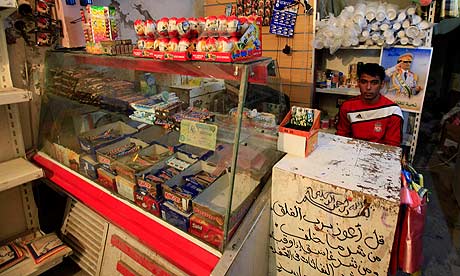Libya crisis proving bad for business in Tripoli
Many shops and restaurants are shut but hospitals and schools are functioning and there is little evidence of food shortages
- guardian.co.uk,
- Article history

A man sits in his shop in the old city of Tripoli. Photograph: Zohra Bensemra/Reuters
In Tripoli's medina, young men stand in the shadows of the narrow alleyways fingering rolls of grubby banknotes, offered in exchange for euros or dollars. "You want money?" they quietly ask the few westerners still in the city, which has seen sporadic coalition bombardment for the past two weeks.
How much, we ask one. There is a pause before he settles on 190 Libyan dinars for $100 – a substantial difference to the official exchange rate of around 120. How's business, how are things generally, we inquire. "Bad," he says, eyes twitching from side to side, wary of the ubiquitous government minders and spies. "The banks are closed, there is no work." He declines to say more.
In the old city souk around him, many shops are shuttered. This is the area of the medina selling jewellery and copperware; in times of conflict and uncertainty, few people's impulse is to shop for decorative adornments.
One black market money-changer does not represent a city, but there have been other pointers to economic insecurity arising from Libya's political and military crisis. A week ago there were long, chaotic queues at every open petrol station, with motorists and pedestrians carrying containers waiting for hours for fuel.
The government blamed this on panic buying and stockpiling rather than any real shortage of fuel. This week the regime cut the already heavily subsidised price of fuel to boost confidence, and queues have diminished. Early in the crisis, the Gaddafi regime also distributed a lump sum of 500 dinars to each family to help with essentials and, no doubt, to reinforce loyalty.
Libya imports about 75% of its food, but there is no evidence in the markets of a shortage of meat, fish and vegetables – although an olive-seller in the medina whispered that dairy products such as milk, cheese and yoghurt were scarce. The subsidised prices appear to have largely remained stable or risen only fractionally.
In the covered fish market Osama Ahmed Omar, 38, said he and his fellow fishermen had almost doubled their hours at sea "to help the country at this time". In the presence of a government minder and a government-appointed translator, he told us: "We're working more so people can be happy and to send a message to the world. It is very important that the British, French and Americans see there is no problem."
Trying to locate the real mood of ordinary Tripolitans is impossible when accompanied by regime officials and very difficult on rare independent forays to try to test opinion. Libyans, conditioned by four decades of restrictions on freedom of expression, are wary and suspicious of talking to strangers.
On an officially sanctioned reporting trip, Sabria Mohammed, a 50-year-old grandmother who had decorated her hands with henna in celebration of the rebels' retreat, insisted there were no problems with shortages of food or fuel. "The only problem is the [coalition] bombing," she said.
Kheria Zaid, a 42-year-old in receipt of 500 dinars a month in government benefits as a divorcee, out shopping for her family's evening meal, said prices were stable, although perhaps the cost of meat had risen by half a dinar a kilo. "The only problem is that the Guide [Gaddafi] should stay in good health," she said.
But, according to the Times of Malta, evacuated migrant workers disembarking from a Ukranian navy ship this week reported increased tension in the capital over food and fuel shortages. And at St Francis Catholic church in Tripoli, which has cut its normal five multilingual services a day to two as its expatriate congregation has dwindled, worshippers spoke of economic difficulties caused by the conflict.
Joey, a Filipino restaurant owner, has closed his business because so few people are venturing out in the evenings, when gunfire can be heard across the city. Kenneth, a Nigerian florist, said most weddings had been cancelled and most hotels, which constitute a significant proportion of his clientele, had closed.
A new Marriott hotel, whose striking display of zig-zag lighting across its facade is visible from much of the city at night, opened on 15 February, the day unrest broke out in Benghazi. Now its 370 five-star rooms are mothballed and its largely migrant workforce has been evacuated.
Hospitals and schools appear to be functioning, but a Polish surgeon based at the city's central hospital said doctors were beginning to run low on some drugs.
It may be the case that the impact of the political and military crisis and international sanctions, plus the exodus of hundreds of thousands of migrant workers, has yet to be felt in Tripoli. But as the weeks go by with no obvious resolution to the crisis in sight, the blithe insistence by regime officials that life in Tripoli is continuing as normal may become harder to maintain.
No comments:
Post a Comment